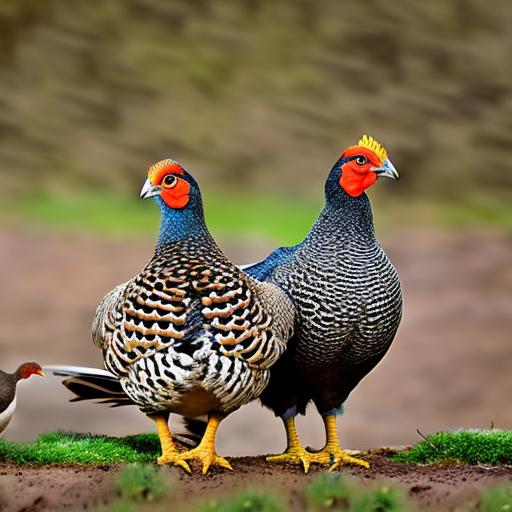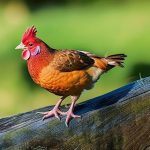Guinea fowl and chickens are both popular domesticated bird species that are kept as pets or for farming purposes. Guinea fowl, also known as guineas, are native to Africa and are known for their distinctive appearance and loud calls. They have a unique helmet-like crest on their heads and are covered in speckled feathers. Chickens, on the other hand, are domesticated birds that are descended from the wild red junglefowl. They come in a variety of breeds and colors, with different sizes and feather patterns.
People keep guinea fowl and chickens for various reasons. Some keep them as pets because they enjoy their unique personalities and behaviors. Others keep them for farming purposes, such as for meat or egg production. Guinea fowl are known for their ability to control pests, such as ticks and insects, which makes them valuable on farms. Chickens, on the other hand, are popular for their egg-laying abilities and can provide a steady supply of fresh eggs.
Key Takeaways
- Guinea fowl and chickens are both popular domesticated birds for their meat and eggs.
- Guinea fowl are more independent and better at foraging, while chickens are more social and better at laying eggs.
- Keeping guinea fowl and chickens together can provide benefits such as pest control and increased flock diversity.
- Potential challenges include aggression and disease transmission between the two species.
- Housing requirements should accommodate the different needs of guinea fowl and chickens, such as roosting preferences and space requirements.
Differences between Guinea Fowl and Chickens
There are several differences between guinea fowl and chickens in terms of their physical appearance, behavior, and egg-laying habits. In terms of physical appearance, guinea fowl have a more distinctive look with their helmet-like crest and speckled feathers. Chickens come in a variety of breeds with different sizes, feather patterns, and colors.
In terms of behavior, guinea fowl are known for being more active and alert compared to chickens. They have a tendency to roam around more freely and are known for their loud calls that serve as an alarm system. Chickens, on the other hand, tend to be more docile and prefer to stay close to their coop.
When it comes to egg-laying habits, guinea fowl lay fewer eggs compared to chickens. Guinea fowl typically lay around 80-100 eggs per year, while chickens can lay anywhere from 200-300 eggs per year, depending on the breed. Guinea fowl also have a longer incubation period for their eggs, which is around 28 days, compared to chickens which have an incubation period of around 21 days.
Benefits of Keeping Guinea Fowl and Chickens Together
There are several benefits to keeping guinea fowl and chickens together. One of the main benefits is pest control. Guinea fowl are excellent at controlling pests such as ticks, insects, and even snakes. They have a keen sense of sight and hearing, and their loud calls serve as an alarm system to alert other birds of potential danger. Chickens also help with pest control by eating insects and other small pests.
Another benefit of keeping guinea fowl and chickens together is companionship. Both species are social animals and enjoy the company of others. They can provide each other with companionship and entertainment, which can be especially beneficial for those who keep them as pets.
Keeping guinea fowl and chickens together can also lead to increased egg production. Guinea fowl are known to be good foragers and can find their own food, which can reduce the amount of feed needed for both species. This can result in cost savings for farmers and potentially increase egg production.
Potential Challenges of Keeping Guinea Fowl and Chickens Together
While there are many benefits to keeping guinea fowl and chickens together, there are also potential challenges that need to be considered. One challenge is aggression between the two species. Guinea fowl can be more aggressive compared to chickens, especially during mating season or when defending their territory. This aggression can lead to injuries or even death if not properly managed.
Another challenge is the different dietary needs of guinea fowl and chickens. Guinea fowl have a higher protein requirement compared to chickens, which means they need a different feed or supplement to meet their nutritional needs. It is important to provide separate feeding areas to ensure that each species gets the appropriate diet.
Disease transmission is also a potential challenge when keeping guinea fowl and chickens together. Guinea fowl are known to be more resistant to certain diseases compared to chickens, but they can still carry and transmit diseases to chickens. It is important to practice good biosecurity measures, such as regular cleaning and disinfection of the coop, to minimize the risk of disease transmission.
Housing Requirements for Guinea Fowl and Chickens
When keeping guinea fowl and chickens together, it is important to provide appropriate housing for both species. The coop and run size should be large enough to accommodate both species comfortably. Guinea fowl require more space compared to chickens due to their active nature and tendency to roam around. The coop should also have separate nesting boxes for each species, as guinea fowl prefer to nest on the ground while chickens prefer elevated nesting boxes.
Roosting preferences should also be taken into consideration. Guinea fowl prefer roosting on low branches or perches, while chickens prefer higher roosts. Providing multiple roosting options can help accommodate the preferences of both species.
Feeding Guinea Fowl and Chickens Together

Feeding guinea fowl and chickens together can be challenging due to their different dietary needs. Guinea fowl have a higher protein requirement compared to chickens, so it is important to provide a feed or supplement that meets their nutritional needs. It is also important to provide separate feeding areas to ensure that each species gets the appropriate diet.
Feeding schedules should also be considered. Guinea fowl are known for their ability to find their own food and are good foragers, so they may not need to be fed as frequently as chickens. However, it is still important to provide regular feedings to ensure that they are getting the necessary nutrients.
Supplemental treats can also be provided to both guinea fowl and chickens. Fruits, vegetables, and grains can be given as treats, but it is important to avoid feeding them anything that is toxic or harmful to their health.
Health Considerations for Guinea Fowl and Chickens
Both guinea fowl and chickens are susceptible to certain health issues, so it is important to take preventative measures to keep them healthy. Common health issues for guinea fowl include respiratory diseases, parasites, and nutritional deficiencies. Common health issues for chickens include respiratory diseases, parasites, and egg-laying problems.
Preventative measures include practicing good biosecurity measures, such as regular cleaning and disinfection of the coop, providing a balanced diet, and monitoring for any signs of illness or disease. It is also important to provide veterinary care when needed and to consult with a veterinarian for any health concerns.
Behavioral Differences between Guinea Fowl and Chickens
Guinea fowl and chickens have different behavioral characteristics that should be taken into consideration when keeping them together. Guinea fowl have a social hierarchy and establish a pecking order within their flock. They are known for their loud calls, which serve as a form of communication and an alarm system. Chickens also have a social hierarchy but tend to be more docile compared to guinea fowl.
Communication styles also differ between guinea fowl and chickens. Guinea fowl are known for their loud calls, which can be heard from a distance. Chickens, on the other hand, have a variety of vocalizations including clucking, crowing, and squawking.
Activity levels also differ between the two species. Guinea fowl are more active and tend to roam around more freely compared to chickens. They are known for their ability to fly short distances and prefer to spend their time foraging for food. Chickens, on the other hand, tend to stay close to their coop and are less active compared to guinea fowl.
Tips for Introducing Guinea Fowl to a Chicken Flock
Introducing guinea fowl to a chicken flock should be done gradually to minimize aggression and stress. It is important to provide separate feeding areas for each species to prevent competition for food. Monitoring for signs of aggression is also important, such as pecking or chasing, and taking appropriate measures to separate any birds that are being overly aggressive.
Can Guinea Fowl and Chickens Coexist Peacefully?
In conclusion, guinea fowl and chickens can coexist peacefully with proper care and attention. While there are differences between the two species in terms of physical appearance, behavior, and egg-laying habits, they can provide companionship, pest control, and increased egg production when kept together. However, there are potential challenges that need to be considered, such as aggression between species, different dietary needs, and disease transmission. By providing appropriate housing, feeding, and veterinary care, guinea fowl and chickens can live harmoniously together.
If you’re considering keeping guinea fowl and chickens together, it’s important to understand the dynamics between these two bird species. While they can coexist, there are certain factors to consider. To learn more about this topic, check out this informative article on Poultry Wizard’s website: Can You Keep Guinea Fowl and Chickens Together? This article provides valuable insights and tips on successfully housing guinea fowl and chickens in the same coop. Additionally, if you’re interested in other poultry-related topics, Poultry Wizard offers a range of articles such as Heater for a Chicken Coop and How to Care for Goslings.
FAQs
What are guinea fowl and chickens?
Guinea fowl and chickens are both domesticated birds commonly kept for their meat and eggs. Guinea fowl are known for their loud calls and ability to eat insects, while chickens are known for their docile nature and ability to lay eggs.
Can guinea fowl and chickens be kept together?
Yes, guinea fowl and chickens can be kept together. However, it is important to introduce them slowly and monitor their interactions to ensure they get along. Guinea fowl can be more aggressive than chickens and may bully them if they feel threatened.
What are the benefits of keeping guinea fowl and chickens together?
Keeping guinea fowl and chickens together can provide a natural pest control solution for your yard or farm. Guinea fowl are known for their ability to eat insects and can help control ticks, flies, and other pests. Additionally, both birds can provide meat and eggs for consumption.
What are the potential drawbacks of keeping guinea fowl and chickens together?
One potential drawback of keeping guinea fowl and chickens together is that they have different dietary needs. Guinea fowl require a higher protein diet than chickens and may need additional supplements to meet their nutritional needs. Additionally, guinea fowl can be noisy and may disturb neighbors or other animals in the area.
How should guinea fowl and chickens be housed together?
Guinea fowl and chickens should be housed together in a secure coop or pen that provides enough space for both types of birds. The coop should have separate areas for nesting and roosting, as well as areas for food and water. Additionally, the coop should be cleaned regularly to prevent the spread of disease.
Meet Walter, the feathered-friend fanatic of Florida! Nestled in the sunshine state, Walter struts through life with his feathered companions, clucking his way to happiness. With a coop that’s fancier than a five-star hotel, he’s the Don Juan of the chicken world. When he’s not teaching his hens to do the cha-cha, you’ll find him in a heated debate with his prized rooster, Sir Clucks-a-Lot. Walter’s poultry passion is no yolk; he’s the sunny-side-up guy you never knew you needed in your flock of friends!







